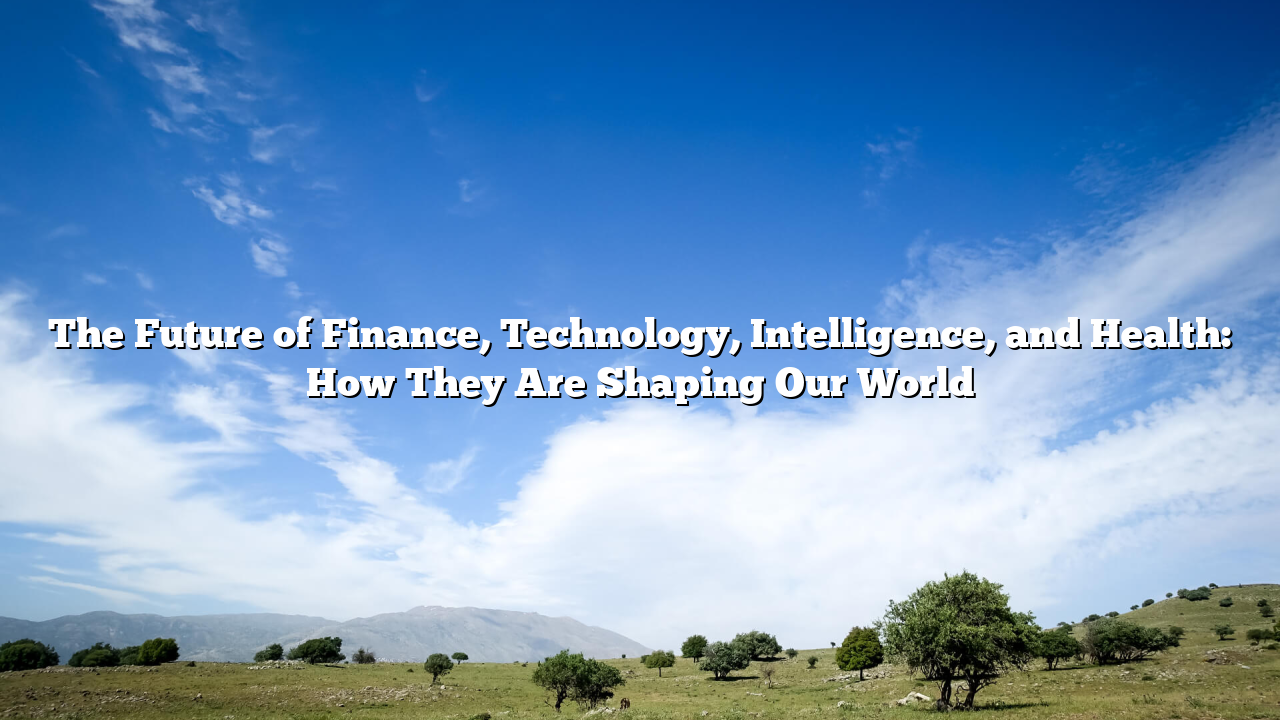As technology advances and the global economy becomes increasingly interconnected, the boundaries between finance, technology, intelligence, and health are blurring. This article examines the synergies between these four domains and their impact on society’s well-being and future development.
1. The Impact of Finance on Global Development
Finance is the lifeblood of economic growth and stability. It encompasses everything from personal banking and investments to corporate financing and government spending. Over the years, the financial industry has undergone tremendous changes, driven by technological advancements and changing consumer behavior. bos303 of digital payments, cryptocurrencies, and mobile banking is revolutionizing how we handle money. Furthermore, the global financial system is more interconnected than ever, with investments flowing across borders and impacting economies worldwide.
In the future, finance will continue to be a driving force behind innovation. The availability of capital for emerging sectors such as green energy, biotech, and artificial intelligence will open up new economic opportunities. However, new challenges such as digital currency regulation, the rise of fintech companies, and financial inequality must be addressed for a fairer financial future. Policymakers must work alongside financial institutions to create regulations that foster innovation while protecting consumers.
2. The Role of Technology in Shaping Our Future
In an age defined by rapid technological advancements, the impact on society is profound. The rise of AI, 5G, and smart technologies is redefining how industries operate, from manufacturing and healthcare to finance and entertainment. While technology offers tremendous potential for improving quality of life, it also introduces new challenges, including the need for digital literacy, cybersecurity, and ethical considerations.
Technology is not just transforming industries; it is also enhancing our well-being. In healthcare, the rise of telemedicine, health apps, and data analytics is improving patient care and making healthcare services more accessible. Wearables and AI-powered devices can monitor patients’ health in real-time, providing valuable data for doctors and patients alike. The convergence of healthcare and technology promises a future where medical advancements are faster, more personalized, and more affordable.
3. The Rise of Artificial Intelligence and Intelligence Systems
Artificial intelligence (AI) is one of the most powerful technologies of the 21st century, with the potential to revolutionize industries ranging from finance and healthcare to education and entertainment. AI is being used to automate routine tasks, analyze vast amounts of data, and improve decision-making processes. In finance, AI algorithms are being used to predict market trends and optimize investment strategies. In healthcare, AI is enabling more accurate diagnoses and personalized treatment plans.
However, the rise of AI also raises ethical concerns. As AI systems become more sophisticated, there are concerns about privacy, job displacement, and the potential for biased decision-making. Ensuring that AI technologies are developed and implemented responsibly will be crucial for maximizing their benefits while minimizing negative impacts. Furthermore, the increasing reliance on AI could raise questions about human autonomy and control over decision-making.
4. Health and Well-being in the Digital Age
Technology is transforming healthcare, making it more personalized and accessible. The use of wearable devices, such as fitness trackers and smartwatches, helps individuals monitor their physical activity and health metrics in real time. Additionally, digital health platforms allow users to engage with healthcare professionals and receive guidance remotely. As technology advances, these innovations will likely play an even larger role in preventive care, improving overall health outcomes.
As technology continues to advance, healthcare delivery will become more efficient and equitable. Innovations such as telemedicine and digital health services are breaking down geographical and financial barriers to healthcare, making essential services more accessible to people in remote areas or underserved communities. This transformation promises to improve health outcomes and promote a more inclusive global healthcare system.
Conclusion
Finance, technology, intelligence, and health are powerful forces driving global progress. While they offer significant potential for improving our lives, they also present challenges that require careful management. By embracing these innovations and addressing the associated risks, we can pave the way for a brighter, more inclusive future for everyone.
